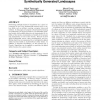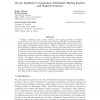199 search results - page 4 / 40 » Intensional Positive Set Theory |
JANCL
2006
13 years 7 months ago
2006
This paper describes an experimental platform for approximate knowledge databases called the Approximate Knowledge Database (AKDB), based on a semantics inspired by rough sets. The...
BSL
2005
13 years 7 months ago
2005
This communication deals with positive model theory, a non first order model theoretic setting which preserves compactness at the cost of giving up negation. Positive model theory ...
GECCO
2006
Springer
13 years 11 months ago
2006
Springer
Positioning multiple sensors for acquisition of a a given environment is one of the fundamental research areas in various fields, such as military scouting, computer vision and ro...
JAIR
2008
13 years 7 months ago
2008
Making a decision is often a matter of listing and comparing positive and negative arguments. In such cases, the evaluation scale for decisions should be considered bipolar, that ...
INFFUS
2006
13 years 7 months ago
2006
The bipolar view in preference modeling distinguishes between negative and positive preferences. Negative preferences correspond to what is rejected, considered unacceptable, whil...


